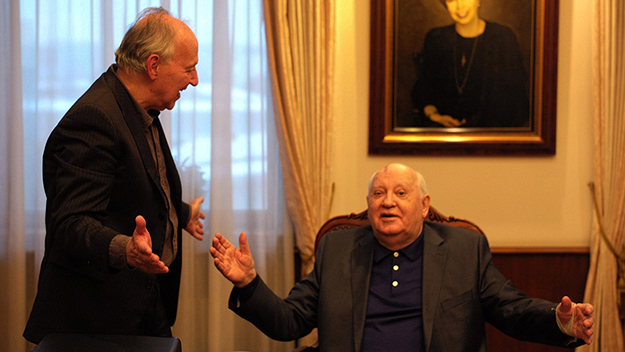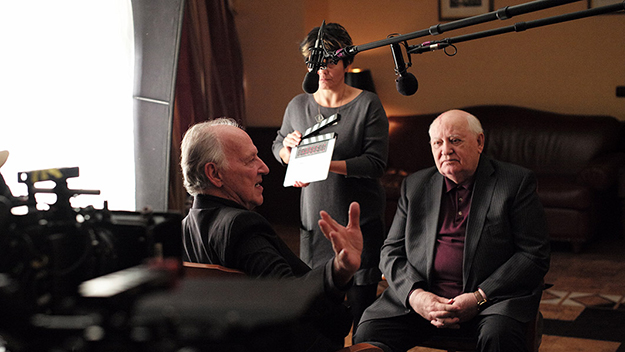Film of the Week: Meeting Gorbachev

Meeting Gorbachev (Werner Herzog and André Singer, 2018)
What becomes a legend most? These days, an interview with someone equally legendary. It will probably depend on your age, and your sense of the comparative importance of cinema and the real world, whether you think the true legend featured in this week’s film is Werner Herzog or Mikhail Gorbachev. It should be said that Meeting Gorbachev, a documentary by the German director and André Singer, gives us relatively little of Herzog’s now trademark idiosyncrasy, which has been a little distracting in some of his recent work. On the other hand, it also gives us relatively little of Gorbachev.
That’s partly, no doubt, because of the difficulty of procuring substantial interview time with the Russian former statesman, now 88 and noticeably frail. Certainly not dismissible as a missed opportunity, nevertheless the film comes across as a frustratingly sketchy (not to say hagiographic) portrait of a man with a uniquely complex and important history. The interview material almost figures as a sporadic bonus element in a somewhat conventional history lesson, rather than as the backbone of a trenchantly insightful essay, the sort you might hope for from a major director.
Herzog’s co-author here is André Singer, best known as a director for his extraordinary Night Will Fall (2014), about the making of the 1945 documentary on the World War II concentration camps; as producer or executive producer, he has been associated with Herzog since 1997’s Little Dieter Wants to Fly. This heavyweight duo have landed an interview with Mikhail Sergeyevitch Gorbachev, General Secretary of the Communist Party in the latter half of the ’80s, and president of the Soviet Union for 22 decisive months in 1990 and 1991, the man who introduced perestroika and glasnost, and who eventually set in motion the dismantling of the USSR—a process that, as he explains here, he never intended to be as complete or as headlong as it turned out to be.
Much of the film is comprised of archive footage and photographic material, with narration by Herzog, outlining Gorbachev’s rise and his days in the limelight—limelight as intense as anyone in modern history has experienced. We learn about the country boy from Privolnie in the Caucasus—seen scowling and square-faced in photos—whose grandfather ran a collective farm. During the Second World War, Mikhail Sergeyevitch’s father—“a famous combine harvester operator”—was believed to be dead, but one day returned home, and told his son about his war experience: “We fought till we ran out of fight.” Gorbachev took it as his lesson on how to live life.
We hear about Mikhail Sergeyevitch’s education at Moscow State University, where he met Raisa, the woman who would be his wife and lifelong confidante. There were larks back then: a wild piece of footage shows young Soviet students putting on a skit satirizing the Western fad of decadent boogie woogie; suffice to say, Jerry Lee Lewis would have found it all a bit full-on.
Rising in the ranks of the Komsomol—the Young Communist League—Gorbachev pursued his own study of rural conditions in his native area, locals being mightily impressed to meet an apparatchik prepared to walk places when transport couldn’t be had. Herzog then tells us that Gorbachev “introduced mechanized modern methods in sheep shearing which soon were adopted throughout the Soviet Union”—those lugubrious tones sounding as if they’re reciting a profile from a ’70s back issue of state organ Isvestiya.
The most enjoyable part of the biography is the section covering Mikhail Sergeyevitch’s rise, in parallel with the gradual exit of the venerable living fossils of the Politburo. In one clip, General Secretary Leonid Brezhnev, giving Gorbachev a medal for a major achievement, has to be reminded what that achievement was (the opening of the Great Stavropol Canal in 1974). When Brezhnev dies, we see his funeral, see the marching troops in Red Square, and hear Chopin’s Funeral March. Leonid Andropov takes over, but 13 months later he dies too: cue coffin, soldiers, Chopin. Enter Konstantin Chernenko, already terminally ill when he comes to power: fake meetings are filmed to make him look functional, but before you know it, Herzog deadpans, “Chernenko joined his predecessors at the Kremlin Wall,” complete with the usual trimmings.
When he succeeded them, Gorbachev meant business in a new way: you might think of him as a sort of business genius, applying new management techniques to a long-established company whose modes of operation were no longer viable. Perestroika, after all, simply means “restructuring.” Unlike the distant, desiccated figures who had once stood on the Kremlin balcony, Mikhail Sergeyevitch had a talent for coming across as a man of the people, and one who was at least more than just technically alive. It had been a long time—at least since Khrushchev’s belligerent wisecracking—since a Soviet leader cracked a smile, let alone a joke, but here’s Gorbachev in the street, talking to a crowd of people, almost nose to nose. “You need to get closer to the people,” someone remarks, and he laughs, “How much closer can I get?”

Meeting Gorbachev (Werner Herzog and André Singer, 2018)
At 88, Gorbachev isn’t quite the affable, energetic man he once was—and perhaps he’s so relaxed because Herzog isn’t exactly pressing him on anything. Bulkier than he was, he seems to have visibly faded, those forceful dark eyebrows now pale and manifestly less expressive. But Herzog’s gentle approach is tainted by an inordinate degree of flattery; a little soft soap is perhaps necessary in some cases to soften politicians up and get them on side, but it’s rather too apparent here, from the moment that Herzog and Singer arrive and present Mikhail Sergeyevitch with a large Happy Birthday plaque in chocolate from a London confectioner (specially tailored to suit the diet of a man with diabetes).
Many of Herzog’s remarks come from a position of out-and-out fan worship. At one point, as the subject turns to Gorbachev’s enabling of German reunification, Herzog tells him that Germans have “absolutely overwhelming approval for you personally—we love you.” Gorbachev tells him that when he first met with the German chancellor Helmut Kohl, they didn’t get on at all, although they soon became close; in fact, Kohl compared him to Goebbels. “Let me apologize for this crazy remark,” Herzog immediately oozes, with the benign, somewhat star-struck smile that rarely leaves his face; but it’s hardly his business to apologize, certainly not when he should have asked Gorbachev what he thought Kohl meant (we never find out). Similarly, talking about the lessons learned from Chernobyl, Gorbachev comments, “Just look at the world today”; again, Herzog neglects to ask him to expand, which is unforgiveable, given that it would have been priceless to know Gorbachev’s exact take on specific aspects of the post-Soviet world he helped create.
Sometimes Herzog appears to be beaming his questions down from another planet entirely, as Gorbachev listens via a small earpiece that presumably feeds him simultaneous translations. What on earth can he or his translator have made of Herzog’s comment about the Greeks actually having a god of the “right moment,” named Kairos: who can possibly care? The questions are often vague, often rambling, but they can also feel seriously misplaced. The worst moment is when Herzog asks about the loss of Raisa, who died in 1999. “Do you remember her voice? Her laughter? Her smell, her perfume?”—a train of questioning that seems at once inappropriately florid for this kind of occasion. “More than you can imagine,” Gorbachev answers with quiet dignity—but Herzog isn’t satisfied. “How much do you miss her?” he asks. What sort of meaningful response can that question possibly elicit? Nevertheless, Gorbachev’s answer is eloquently terse: “More than you can imagine.” It’s perfectly appropriate at this point to cut to Mikhail Sergeyevitch, weeping at his wife’s funeral—and, no doubt, historically pertinent to then show a young, poker-faced Vladimir Putin gazing icily at the deceased’s open coffin, even if this shot does feel like a faintly ghoulish intrusion (which is perhaps the intention).
What Gorbachev himself conveys throughout is appropriate dignity—never more so than in the moment of his resignation from the presidency: pressured to turn the moment into a photo opportunity, a propaganda moment for the succeeding regime, he refuses, and signs his resignation before the official cameras are turned on.
Other interviewees include erstwhile Polish president and Solidarity leader Lech Walesa, who remembers being skeptical about the advent of Gorbachev, and knowing that Communism couldn’t be reformed but was destined to collapse; Ronald Reagan’s Secretary of State George Shultz; and Miklós Nemeth, Hungary’s former Prime Minister. He remembers realizing that Gorbachev was a different kind of Soviet leader, partly because, on a visit to Hungary, he wanted to just get on with business, rather than demanding tailor-made suits, as his predecessors had apparently done. Nemeth took down the wire around Hungary’s border to see how Moscow would react but, he remembers, “there was no ring on the hot line.” He then staged a press stunt, cutting the barbed wire in front of the press; Austrian TV didn’t get the significance of this event, but ran it second on the evening news, after an item about trapping slugs.
The film’s real insights ought to come at this point: there’s an entire film to be made in detail just about those last two years of the USSR, and that insane rush of event that the world has not yet taken fully understood, nor recovered from. It’s here that Gorbachev’s rueful, laconic comments take on a resonance of which we can only imagine the full extent. What did the end of the Soviet Union mean to him personally? He draws a heavy breath: “I regret it to this day.” Rather than dissolving the Soviet Union, he says, he should have given the republics more power—but the process couldn’t be halted once it had started, because certain parties were in too much of a rush, jockeying for power. A whole different alternative history is gestured at here, rather than the actual course of events that we’ve become used to assuming was inexorable.
There’s only one moment in the film—and it comes in this section—that mitigates the view of Gorbachev as an entirely cuddly, jolly uncle among politicians. He was, after all, the head of the Russian state, and—while he was immeasurably more human than his predecessors—historically, that entails certain things. We get a glimpse of this when he says that people asked him why he didn’t stop his opponents rushing ahead with their plans, and admits that he missed a trick in not better controlling his “reckless” successor-to-be Boris Yeltsin. “I should have sent him off somewhere,” he says. I looked for an impish, self-mocking smile, but I don’t believe I saw one.
Jonathan Romney is a contributing editor to Film Comment and writes its Film of the Week column. He is a member of the London Film Critics Circle.







